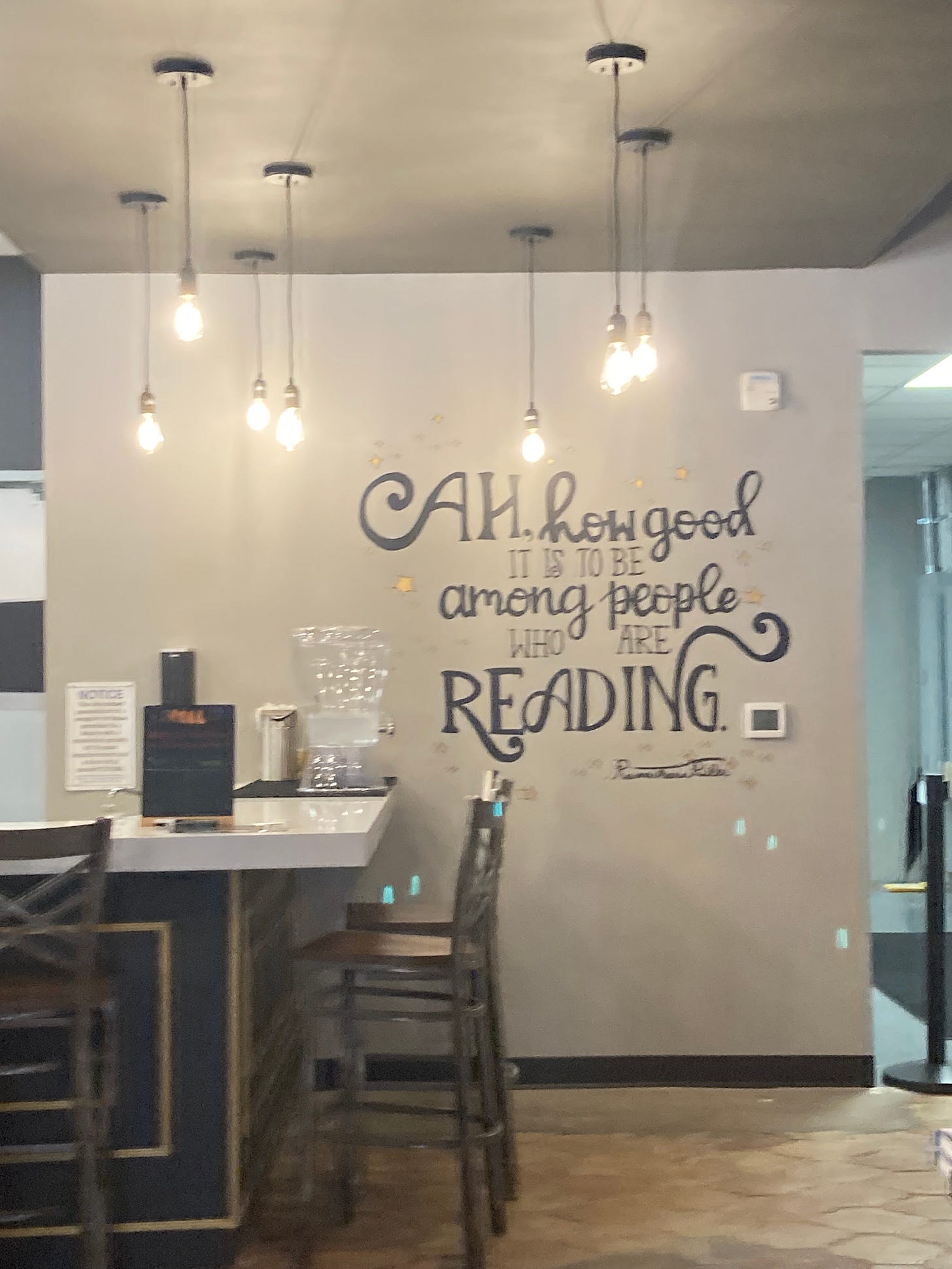I was an avid reader as a kid, but got out of the habit in high school and college as the demands on my time grew faster than I learned how to manage them. I resolved to fix this trend with a simple goal: read one book a month and write it down. That goal looks very minimal in comparison to how much I want to read and how much I read now, but it was the baby step that paved the way for the kind of reading that I’m able to do now, even in the most bananas of months.
I no longer have reading goals, although I do keep “one a month” in my head to minimize my excuses for scrolling rather than reading. I attempt a balance of fiction and nonfiction, though what I end up reading is guided more by Libby hold times than anything else. I check in on the identities of the authors and characters I’m reading about once a quarter and look for ways that I can expand my understanding of experiences that are different from mine. I’m deeply responsive to my mood and what’s going on in my life; I save short stories and poetry for times when my brain can’t focus on anything else, and I don’t finish books that I haven’t found value in by, usually, Chapter 3 or so (life’s too short for all that). I don’t think that reading should ever be a competition (which puts me at odds with my chosen profession), and I believe deeply that people should read what and how they want, and that those choices are not up for judgment.
My recording process has changed over time, from a written list in my planner (which I lost) to a simple typed list to a more categorized list like this year’s. You can see my current full list of books and cataloging system here. Sharing this whole list with the internet is mildly terrifying. It also doesn’t always feel reflective of the intellectual work that I’m doing or the breadth of my interests, or it casts in stark relief what I say I care about and how I actually spend my thinking time. That said, I think that the media we take in tells a story not only about who we are but about how we approach a period of time, just like your wedding guest list reflects a variety of priorities and a specific moment in time. So it’s here.
When I look back at my books from the year, I’m transported to the headspace I was in when I read those books: which blanket I was making while listening, the obsession with a book that I couldn’t shut up about, the way one particular author captivated my imagination and took over my thoughts for a while. I can also see patterns in my life reflected: the month I only read three books (February’s always rough) compared to the month where I read almost ten (there were a lot of airplanes involved); the patterns of reading enjoyable fluff versus something “more substantial” (a false hierarchy if there ever was one); the months where clearly I was looking for answers to bigger questions about certain topics.
There were a lot of books that I loved this year, particularly The Latecomer and Signal Fires in fiction (those books are too long and complex to talk about - read them!), and continued an out-of-character trend from the pandemic of reading romance novels. Thank You for Listening, despite a somewhat contrived plot twist mid-way through, was deeply enjoyable as an audiobook, especially because of its meta commentary on the industry (God, I love anything that explains how something I know nothing about works!), and I continue to be a huge Emily Henry fan. I liked all of Roselle Lim’s books, but Sophie Go’s Lonely Hearts Club surprised me by taking a step up from being interesting gentle magical realism to really hanging on to my heart.
In the world of nonfiction, Did Ye Hear Mammy Died? struck an exquisite balance of educational and entertaining and funny and serious and all the contradictions (much like the country that is its focus), and I’ve never read an Ann Patchett essay collections that didn’t change me; These Precious Days worked its way in somewhere even deeper than This is the Story of a Happy Marriage did nearly a decade ago, which I didn’t think was possible. Ever a memoir reader, Enchantment (a memoir/nonfiction combo) and You Could Make This Place Beautiful undid me for different reasons.
I read a LOT of books on yoga this year. Poser and Yoke showcased how much attitudes within yoga in the west have shifted in the past 20 years and also how they have not. I recommend Nischala Joy Devi’s version of the yoga sutras, though, in the interest of full disclosure, it’s the only one that I’ve finished. This is the first year that I feel like I’ve explored an intellectual interest in yoga on the page in addition to the mat, and I found that the reading did deepen my practice in unexpected ways.
The books on my Libby shelf as this year comes to a close are Tom Lake by Ann Patchett (narrated by Meryl Streep), Pineapple Street, You Will Find Your People, and The Collected Regrets of Clover, and I’m looking forward to Designing Your Life becoming available, as well as Everything I Learned I Learned in a Chinese Restaurant. I have also set aside structured time to review NPR’s Book Concierge (I know the name changed, but I like this one better, so I’m keeping it) to build my To Read list for the future; I’d love to hear what you read this year, how it changed you, and what stories you’re looking forward to in 2024.




